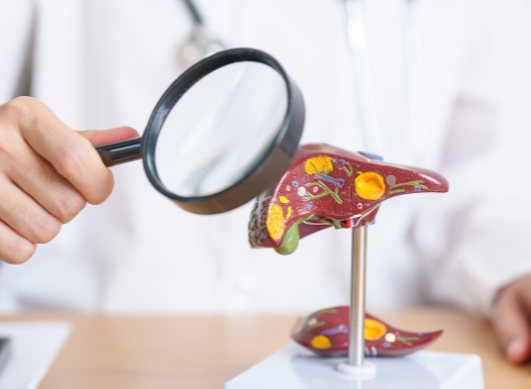NASH, or "fatty liver disease": Understanding treatments
Published Jan 24, 2020 • By Camille Dauvergne
After getting diagnosed with non-alcoholic steatohepatitis or NASH (non-alcoholic steatohepatitis, a complication resulting from excess fat deposits in the liver), patients often feel overwhelmed: also known as "fatty liver disease", there is no known cure! Even if there's no one medication to treat it, managing its symptoms is possible.
What is NASH? What treatment options are available?
Read our guide to find out more!

Understanding non-alcoholic steatohepatitis, a complex illness
Non-alcoholic steatohepatitis, also known as NASH, is an illness caused by a number of factors and its characteristics are numerous: insulin resistance, inflammation, oxidant stress, an increase in fat deposits in the liver and sometimes dyslipidemia (an excess of lipids in the blood). Patients often present other risks factors such as obesity, type-2 diabetes, hyperglycemia, high levels of triglycerides and/or LDL-C ("bad cholesterol") and low levels of HDL-C ("good cholesterol"), which also greatly increases patient risk of cardiovascular disease.
>> Discover our NASH fact sheet here! <<
Treating NASH means treating not only the symptoms of the illness but also reducing a patient's risk of developing heart disease.
Treating NASH
Even if the risks factors for developing NASH as well as the mechanisms of the illness are clear, there is for the moment no medication cleared for use on the market to cure it; and therefore there's no one medication prescribed to treat it either. However, some solutions do exist: the number one treatment is lifestyle change (diet and physical activity). The medications that can be prescribed are to treat the symptoms of NASH and not the illness itself: they target obesity, diabetes, high blood pressure and dyslipidemia.
Diet change
Diet change is crucial and consists of:
- Calorie restriction to encourage weight loss,
- Reducing saturated fats (meat, butter, dairy products, etc.) and replacing them with mono or polyunsaturated fats (vegetable oil, fatty fish, nuts and seeds, etc.),
- Upping fiber intake, particularly soluble fibers (fruits and vegetables, whole grains, etc.),
- Severely limiting or completely cutting out all soft drinks (soda and fruit juice), processed foods, foods high in sugar and/or fat and alcohol (patients with severe fibrosis or cirrhosis of the liver should not drink alcohol at all),
- Consuming (black) coffee seems to have a positive effect on hepatic steatosis, so you can drink to your heart's content (Provided your heart's content does not surpass 6 cups per day!),
- Avoiding fad diets and products that promise rapid weight loss. They are often more harmful than helpful and may result in weight gain once you go off the diet.
Regular physical activity
Regular physical activity adapted your abilities is essential and compliments diet changes. Patients are encouraged to do at least 2 to 4 hours of exercise per week, spread over 3 to 5 sessions (brisk walks, cycling, swimming, etc.). It's important to do a physical activity you enjoy, to help you stick to it.
Changing habits and behaviors
In general, behavioral therapy or psychological support may be prescribed as a complement to changes in diet, activity and medication. It has been shown that support of this type is associated with significantly better weight-loss results in obese patients. If the patient is suffering from an eating disorder (sugar or salt addiction, bulimia, stress eating, etc.), they will be prescribed treatment by an addictology professional or behavioral therapy.
Medications to treat symptoms
If diet and exercise changes are not enough to correct metabolic factors (diabetes, hyperlipidemia and high blood pressure), a doctor may prescribe medications proven to pose a low risk to the liver.
The therapeutical arsenal for NASH treatment brings together a number of medications to treat individual symptoms:
- Statins, such as atorvastatin (Lipitor®), to lower cholesterol and triglycerides
- Fibrates, like fenofibrate (Antara®, Fenoglide®) to reduce triglycerides
- Metformin (Fortamet®, Glucophage®, Glumetza®) to lower blood sugar levels
- Antihypertensive medications like losartan (Cozaar®)
- Anti-TNF alphas, to reduce inflammation
- Adiponectin, which fights excess lipids in the blood
Some treatments are even more precise in their targets:
- Aramchol or liraglutide (Victoza®) target hepatic steatosis
- Elafibranor, a new treatment for inflammation and "hepatocellular ballooning", that is expected to be approved for NASH treatment in 2020
Bariatric surgery
Bariatric surgery is both one of the most radical, most effective and long-lasting weight loss treatments (40 – 71%) among patients who are morbidly obese or who are both obese and diabetic. However, although its effect on weight loss has been proven, it's not yet known if it has any effect on NASH.
Other treatments
Some non-medical treatments have been found to be helpful in treating NASH including:
· Rice Bran Arabinoxylan Compound or RBAC, taken as a dietary supplement, is composed of soluble rice bran particles that have been partially hydroxylated by a complex natural enzyme extracted from Shiitake mushrooms. It is a good source of soluble fiber, promotes regularity, lowers cholesterol and contains antioxidants.
· Probiotics may also be recommended as a complement to a balanced diet for patients living with NASH
None of these substances is a substitute for a healthy diet, but they can be used as complements.
Treating NASH - Overview
· When faced with hepatic steatosis and the possibility of developing NASH, a patient should immediately modify their lifestyle and begin a treatment to target the steatosis and reduce it
· When faced with incipient NASH or advanced NASH without fibrosis or minimum fibrosis, lifestyle changes should be initiated immediately, along with a chronic treatment to reduce NASH symptoms and to target the steatosis to reduce it.
· If the patient has advanced fibrosis or cirrhosis, treatment to reduce the fibrosis must be initiated immediately, as well as a chronic treatment to reduce the NASH symptoms and target the steatosis to reduce it. At the same time, the patient must begin lifestyle changes immediately
Battling NASH means battling bad dietary habits, something that is on the upswing all over the world, and avoiding processed foods, sedentary lifestyles and chronic stress. It means an approach that is global and individual at the same time, tailored to the needs of each patient.
Warning, This article is a general overview and does not replace medical advice. It does not take into account the variations that exist between individual patients. Every patient is different and should always consult their physician before modifying their treatment!
2 comments
You will also like

Fatty liver and family life: How to find the right balance when living with NAFLD and NASH?
Jun 3, 2025

 Facebook
Facebook Twitter
Twitter



